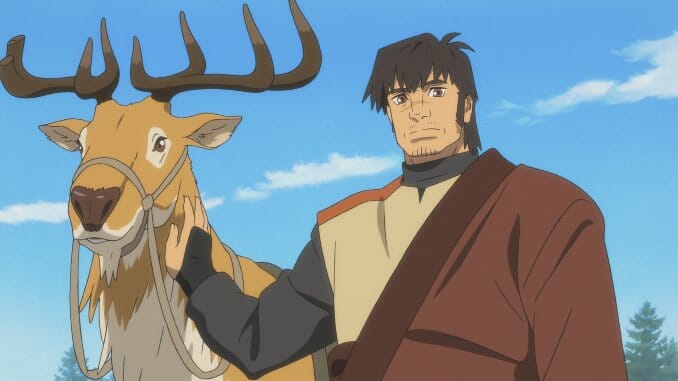Ambitious, Gripping Anime The Deer King Tries to Rule over Too Much

The blood of one soldier could save a nation, but he’s more interested in reclaiming what was lost. The Deer King, the latest production by acclaimed anime studio Production I.G, is not only an adaptation of author Nahoko Uehashi’s 2017 The Deer King fantasy novels, but an announcement of new anime feature filmmaking talent. Having worked on the animation of several Studio Ghibli films and 2016’s worldwide sensation Your Name, Masashi Ando makes his directorial debut with The Deer King alongside Masayuki Miyaji. With this experienced creative team, The Deer King should be a slam dunk. Unfortunately, its good ideas have been diluted by a confusing narrative that subtracts from the main journey.
A conflict between two nations has caused unrest throughout the lands. Deep within a mine controlled by the Zol empire, the deadly Black Wolf Fever annihilates anybody in its path. Everybody except for enslaved former soldier Van (Shinichi Tsutsumi) and young girl Yuna (Hisui Kimura). Both were bitten by wild dogs carrying the illness, but miraculously survived. Having a chance at a new life, Van takes Yuna under his wing. His interactions with Yuna and others are some of the more rewarding parts of The Deer King. Not only is it heartwarming to see this found family come together, but Van’s backstory provides additional resonance for that relationship. Van’s a little more guarded with the other people he comes across, but some genuinely affecting relationships grow. As the disease continues to infect the Zol empire, there are those who’ve learned of Van’s survival and seek him out in order to find a cure. Van’s story focuses on what happened to his family, his paternal feelings toward this orphaned child, and how the people you encounter throughout your journey can often become your new family.
One of those interested in Van’s whereabouts is Hohsalle (Ryoma Takeuchi), renowned doctor of the Zol empire. Hohsalle is a man of science and he believes there must be a reason why this plague continues to ravage the land. He refuses to believe that it’s simply an act of God and he’ll risk his life to prove it. The Deer King novels won the fourth Japan Medical Novel Award for its themes of medical care, and the film excels with its depictions of medical science. Whether it’s close-ups of Hohsalle working on vaccines or the crude instruments that he has to work with, his scenes—of medical procedures and methods—are given great detail, and that’s not even mentioning the scenes that depict how the Black Wolf Fever has decimated its victims. That Hohsalle’s mission is given almost equal footing to Van and Yuna’s adventure gives his narrative a lot of importance where it could otherwise be an afterthought.
As a Production I.G feature, The Deer King meets the expectations of quality you’d expect from the studio best known for its work on the Ghost in the Shell series, volleyball show Haikyu!! and Adult Swim series Fena: Pirate Princess. Since The Deer King is adapted from Uehashi’s novels, the character designs are reminiscent of her other work, Moribito: Guardian of the Spirit. Meanwhile, from first glance, the world of The Deer King looks like it was highly influenced by the Studio Ghibli film Princess Mononoke. Princess Mononoke, and by extension Hayao Miyazaki, created a lush forest landscape where the destruction of the environment led to a curse that the protagonist must overcome. The curse itself looks like a sea of slugs, completely engulfing the characters. That’s not unlike the Black Wolf Fever which moves like a giant ooze of purple miasma that tears through whoever is in its path. Ando worked on Princess Mononoke, so the influence is not unfounded, especially when you have deer-like animals like the pyuika (similar to Princess Mononoke’s Giant Serow) and cursed heroic warriors as some vital pieces of the narrative.